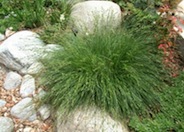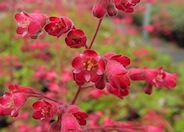
Common name:California Field Sedge
Botanical name:Carex praegracilis
This native Carex can be successfully used as a lawn substitute but requires significant water to obtain good coverage. Once coverage is reached, water can be reduced and maintenance is close to zero. Unmowed, the plant can be used effectively in a variety of conditions and will reach a height of 6" or under and spreads up to 2' by rhizomes.

Common name:Santa Ana Cardinal Coral Bells
Botanical name:Heuchera 'Santa Ana Cardinal'
This Heuchera is believed to be a hybrid between the native Heuchera maxima and the non-native Heuchera sanguinea. The name is a little misleading as the flower is more pinkish red than it is red or cardinal. It is best used in dry shady conditions with well drained soil. Once established, it requires little care. It is susceptible to mealy bugs and root rot if it receives too much water. It grows to 18"-24" tall and wide. It looks great in mass plantings.

Common name:Eastern Redbud
Botanical name:Cercis canadensis
This small, deciduous tree with a rounded head is covered with small flowers of a rose pink color in the spring before the appearance of heart-shaped leaves. It can grow to 25' tall with an equal spread. It has a low branching habit with a rounded form. Leaves turn yellow green in the fall.

Common name:California Gray Rush
Botanical name:Juncus patens
Although a wetland plant, Juncus patens can tolerate fairly dry conditions. It will slowly clump to 2'-3' wide and a height of 2'-2.5'. There are many selections of this species available with different heights and widths. It is carefree, with little to no maintenance. It provides great upright structure to many styles of landscapes.

Common name:Canyon Prince Wild Rye
Botanical name:Leymus condensatus 'Canyon Prince'
One of the best known and utilized native grass selections in Southern California, this beautiful, blue gray foliage spreads out 3'-4' or more. It will reach a height of 2'-3'. It rarely flowers. It does spread by rhizomes although not as vigorously as some closely related species. It can be extremely drought tolerant and care must be taken not to over water this species as it can rot from the center. Otherwise, it is carefree and requires virtually no maintenance.

Common name:Lindheimer's Muhly
Botanical name:Muhlenbergia lindheimer
Native to Mexico and Texas this stunning clump forming grass is winter dormant grass in cold climates, but usually semi-deciduous in mild climates. From the fall into winter emerge the 5 ft tall upright flower inflorescence, that rise well above the blue-gray foliage. The flowers are at first purple then mature to a gray color. Best in full sun with regular watering but will tolerate drought and light shade. -Randy Baldwin
San Marcos Growers
| Designer: Rick Fisher | Stone Corner |
Photographer: GardenSoft |
Soils and Compost:
Physical weed control, including mulching, or hand removal protects the watershed from harmful chemicals.
Water Saving Tip:
Mulching and adding compost to soil can minimize evaporation and help soil absorb and store water.
Integrated Pest Management:
Remove irrigation water and fertilizer from areas where you don't want weeds to grow.
